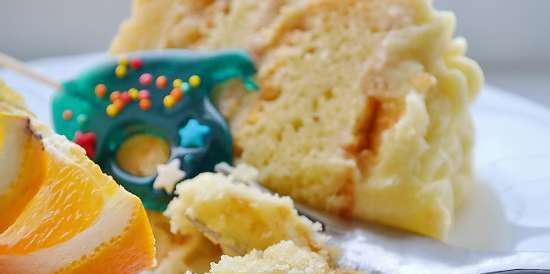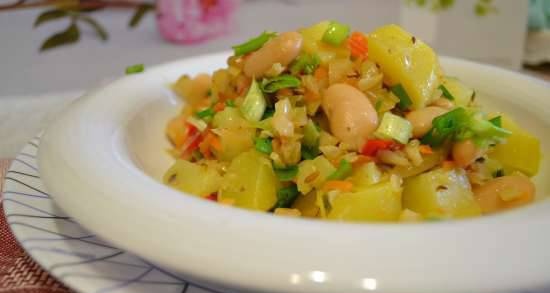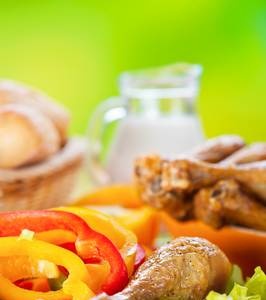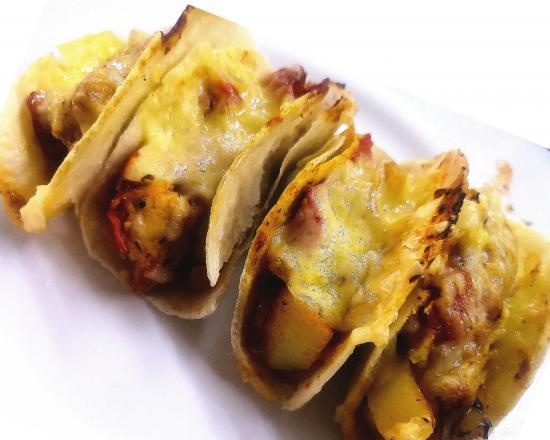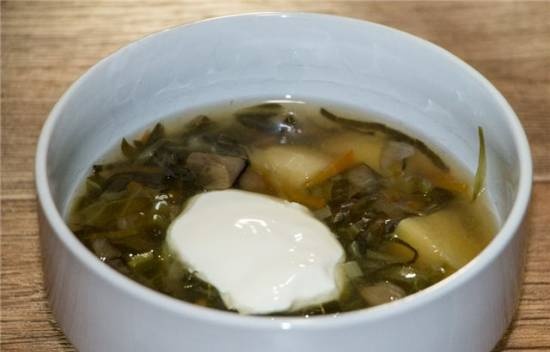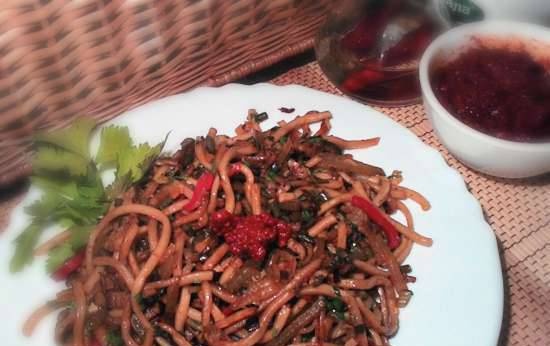|
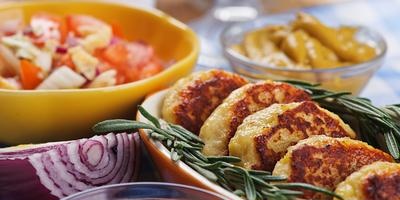 • Before you start cooking, put on an apron, tie your hair with a kerchief, wash your hands thoroughly, and brush your nails with a brush. • Before you start cooking, put on an apron, tie your hair with a kerchief, wash your hands thoroughly, and brush your nails with a brush.
• Any dish that is new to you should be started only after you make sure that you understand the recipe well.
• Place the products indicated in the recipe on the table, prepare the dishes and equipment: pans, boards, knives, etc. Observe the sequence of operations provided in the description.
• Do not forget to add sugar if you want to prepare a dish using the speed method, but salt also plays an important role, so almost always put it with sugar.
• Store fats correctly, do not leave them open in the kitchen - they lose their taste and quickly deteriorate.
• Fry food in an open pan and good flame, except chicken-tapaka (I was not mistaken, because tapak is a deep frying pan with a heavy lid, usually this dish is cooked in it in Georgia). However, you can cook tapaka chickens in a regular frying pan, but there should be no holes or dents on it. These utensils must be covered with a heavy lid or yoke.
• Poisonous and temporarily poisonous foods can cause food poisoning. For example, potatoes with sprouted eyes or green tubers contain solanine. A person who has eaten such a potato feels a burning sensation in the esophagus, salivation, pain in the stomach. To avoid this, you need to carefully select the eyes of the sprouted potatoes, peel the peel well. Suspicious potatoes should be boiled peeled, as solanine tends to accumulate in the rind.
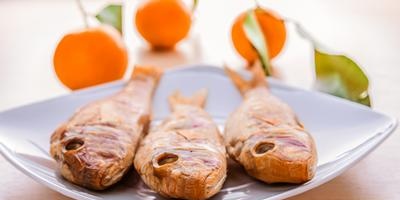 • Poisonous impurities (copper, lead, zinc, antimony) in non-vegetable products can get into food from copper, tinned, galvanized, and also glazed earthenware (glechikov, bowls, cups) if used improperly. For example, bare copper utensils, cleaned to a shine, can be used exclusively for boiling jams and marmalades. After use, it must be thoroughly washed and dried so that there is no metal oxidation when moisture and oxygen combine with copper. • Poisonous impurities (copper, lead, zinc, antimony) in non-vegetable products can get into food from copper, tinned, galvanized, and also glazed earthenware (glechikov, bowls, cups) if used improperly. For example, bare copper utensils, cleaned to a shine, can be used exclusively for boiling jams and marmalades. After use, it must be thoroughly washed and dried so that there is no metal oxidation when moisture and oxygen combine with copper.
• Do not cook or store any food in copper basins: cases of poisoning are known borsch, kvass, compote, which were in a copper dish. A significant amount of oxide can be contained in the glaze of pottery. To avoid poisoning, do not store acidic foods in it (pickled cucumbers, sauerkraut, borsch, etc.).
• Enamel dishes, steel and cast iron should not be "scrubbed", as the surface of the metal is destroyed, and this can cause foreign bodies to enter the human body. We advise you to fill the dishes with hot water, add a little baking soda or mustard and put on the fire for a while (add 2 teaspoons of soda to 1 liter of water). You need to wash the dishes with a brush or washcloth. You cannot scrape enameled dishes with a knife, rub them with sand or emery - the enamel crumbles, breaks off and can get into food.
• After frying, pans that are still hot should be washed thoroughly immediately and not wiped off with a cloth or paper. It is necessary to wash so that the fat is completely removed.
• Aluminum dishes are washed with hot water with baking soda and ammonia, which are good at removing fatty substances. After that, the dishes must be rinsed. If the walls of aluminum pots are darkened, the plaque can be removed with a cotton swab soaked in a solution of vinegar diluted with water. If the aluminum dish is completely blackened, you can wash it by filling it with water in which 3-4 tbsp. tablespoons of vinegar. In this case, the water should boil for 10-15 minutes.
• To wash the bottom of the dishes from burnt food, you need to sprinkle it with a thick layer of salt and wash it after a few hours. Burnt milk dishes are easy to clean if left for a short time with water and sifted wood ash.
• To wash teapot or a coffee pot, pour water into them, add 1 tbsp. a spoonful of baking soda, boil, then rinse several times with warm water. The coffee pot is easy to clean from the inside if you first boil clean water with lemon wedges in it,
• We recommend wiping metal sheets from the oven with a solution of baking soda in cold water.
• Coffee grounds are good for washing glassware, glasses, wine glasses, vegetable oil bottles. You can clean any metal utensils with coffee grounds: put the coffee grounds on a wet cloth and thoroughly wipe the dishes with it, then rinse them with cold water.
• For the cleaning meat grinder after rolling the fatty meat, pass raw potatoes through it, and then rinse with hot water.
• Knives are well cleaned with a cork stopper, rust is removed from them with a slice of onion. Stubborn stains can be removed with lemon juice and wiped with a woolen cloth and toothpaste.
• Silver spoons, forks, knives, cup holders can be renewed by washing them with a soda solution (for 1 liter of water, 1 tablespoon of baking soda).
• Glassware, goblets and wine glasses will become clear if rinsed in water acidified with vinegar or rubbed with salt, then washed and allowed to drain without wiping.
• In the buffet, where dry food (bulk) is stored, it is necessary to put a vessel with crushed charcoal, changing it from time to time and not allowing it to become damp: coal absorbs extraneous odors well. It also absorbs them well ground coffee.
• The frying pan is often the main reason for the hostess's culinary failures. In particular, during the frying process, the meat either sticks or burns in it. To prevent this from happening, never scrub or scrape it, do not wash it with cold water. By the time frying begins, the pan should be preheated to 150 ° C or more. This can be determined as follows: sprinkle water on the bottom of the pan with wet fingers - if water droplets start scattering along the bottom, then the temperature is below the required one, at 150 ° C and above the water instantly evaporates.
• When serving fresh cucumbers and tomatoes, do not cut or salt them in advance, otherwise they will lose their taste, smell and wither quickly.
• If potatoes are included in the salad, they should be chopped and added last, as they spoil faster than other vegetables.
• Vegetables for salad (potatoes, carrots, beets, turnips) are best cooked in the peel - they will retain more vitamins.
• Vegetables should only be washed in cold water - warm water impairs the taste and aroma.
• Keep slightly frozen potatoes at room temperature for 5-7 days - the sweet taste will disappear.
• Put wilted greens in cold water for an hour and add a tablespoon of vinegar.
• Parsley, dill, green onions, garlic put in the first and second courses just before serving. Do not boil them, i as they very quickly lose their smell and taste.
• The salt will not become damp if you put rice grains in the salt shaker.
• Mustard, diluted with milk instead of water, retains better, does not dry.
• A pinch of sugar added during cooking to vegetables improves their taste.
• To make the broth tasty, rich, strong, put the meat in cold water. And if at the end of the park you add carrots and onions baked without oil in a pan, the broth will turn out to be especially fragrant and beautiful (golden brown). To get a fragrant and tasty bone broth, the bones need to be finely chopped, placed in the oven, fried, and then poured over with cold water.
• Sauerkraut, pickles and nettles put in soup when the potatoes are already cooked. If put together with potatoes, then it will harden and cook for a long time.Sorrel and nettles should be placed in an almost finished soup and cooked in an open bowl, then they retain their green color.
• For a quicker meat soup, cut the meat across the grain (in the form of large noodles) or use it into meatballs.
 • Put the bay leaf in the soup no earlier than 5 minutes before the end of cooking, and in the second courses - 10 minutes, otherwise the food will have a bitter taste. • Put the bay leaf in the soup no earlier than 5 minutes before the end of cooking, and in the second courses - 10 minutes, otherwise the food will have a bitter taste.
• So that the soup is not cloudy, rice, millet, buckwheat, oats for the first courses should be washed in warm water several times.
• When boiling meat, do not salt it right away. Salt causes premature release of meat juices, which impairs taste and nutritional value.
• Meat will not stick to the bottom of a pot or pan if you put a few pieces of carrot in the fat.
• Old meat tastes better if you grease it with mustard (beef) or garlic (lamb) a few hours before cooking.
• Meat tastes better if it is frozen quickly and thawed as slowly as possible.
• Meat a rabbit it will be tastier if you pre-hold it in milk for 30-40 minutes.
• The liver tastes better if the portions are cut, sprinkled with salt and pepper, and fry first without fat, then in fat with onion.
• Liver it tastes better if boiled in milk.
• Rub the thawed poultry carcass with flour (to raise the remaining feathers' and hairs) and carefully, so as not to damage the skin and not melt the subcutaneous fat, burn it on a gas stove.
• Fish after cutting it should be salt, sprinkled with spices, put on a cutting board for 30 minutes and only then fry.
• Tomato for borscht, second courses should never be fried (sautéed) beforehand, but put directly at the end of cooking from a freshly opened can. Housewives who cook the tomato themselves should use it as a vitamin juice.
• First meal according to the accelerated method, they cook with a closed lid, and the ear, on the contrary, in an open pan, then it will have a pleasant smell.
• Among culinary experts, there is an opinion that vegetables do not boil well in an acidic environment, only potatoes taken with sorrel acquire a loose consistency and boil faster than in ordinary water. Taking this into account, we offer vegetables for vinaigrette, salads, borscht, cabbage soup, soups, side dishes to sauté in fats (vegetable and animal) for no more than 6-8 minutes. For example, beet, carrots, potatoes, white roots, green bell peppers, parsley, dill are brought to readiness, if they are young, in 6 minutes, if last year - in 8 minutes of heat treatment.
• Steaming significantly reduces the loss of soluble substances in vegetables. So, when steamed, potatoes lose 4-6 times less soluble substances than in water. Therefore, we recommend sautéing vegetables in a tightly sealed container.
• Potatoes, white cabbage, onions (white) during the heat treatment by the accelerated method do not turn yellow or darken, retain their natural color. The pigments that give beets a red-violet color are not destroyed, the beets become soft. For vinaigrettes, it is recommended to cook it no more than 15 minutes, for borscht - no more than 6-8 minutes.
Shishlakova-Gnezdilova S. I. Culinary wisdom in minutes
|
 • Before you start cooking, put on an apron, tie your hair with a kerchief, wash your hands thoroughly, and brush your nails with a brush.
• Before you start cooking, put on an apron, tie your hair with a kerchief, wash your hands thoroughly, and brush your nails with a brush. • Poisonous impurities (copper, lead, zinc, antimony) in non-vegetable products can get into food from copper, tinned, galvanized, and also glazed earthenware (glechikov, bowls, cups) if used improperly. For example, bare copper utensils, cleaned to a shine, can be used exclusively for boiling jams and marmalades. After use, it must be thoroughly washed and dried so that there is no metal oxidation when moisture and oxygen combine with copper.
• Poisonous impurities (copper, lead, zinc, antimony) in non-vegetable products can get into food from copper, tinned, galvanized, and also glazed earthenware (glechikov, bowls, cups) if used improperly. For example, bare copper utensils, cleaned to a shine, can be used exclusively for boiling jams and marmalades. After use, it must be thoroughly washed and dried so that there is no metal oxidation when moisture and oxygen combine with copper.